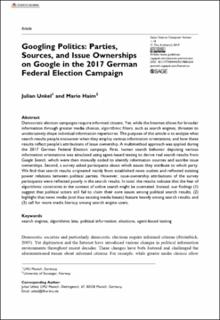| dc.contributor.author | Unkel, Julian | |
| dc.contributor.author | Haim, Mario | |
| dc.coverage.spatial | Germany | en_US |
| dc.date.accessioned | 2020-06-24T13:07:30Z | |
| dc.date.available | 2020-06-24T13:07:30Z | |
| dc.date.created | 2019-10-11T11:19:54Z | |
| dc.date.issued | 2019-12 | |
| dc.identifier.citation | Unkel, J., Haim, M. (2019) Googling politics: Parties, sources, and issue ownerships on Google in the 2017 German Federal Election campaign. Social science computer review, pp. 1-18. | en_US |
| dc.identifier.issn | 0894-4393 | |
| dc.identifier.uri | https://hdl.handle.net/11250/2659347 | |
| dc.description.abstract | Democratic election campaigns require informed citizens. Yet, while the Internet allows for broader information through greater media choices, algorithmic filters, such as search engines, threaten to unobtrusively shape individual information repertoires. The purpose of this article is to analyze what search results people encounter when they employ various information orientations, and how these results reflect people’s attributions of issue ownership. A multimethod approach was applied during the 2017 German Federal Election campaign. First, human search behavior depicting various information orientations was simulated using agent-based testing to derive real search results from Google Search, which were then manually coded to identify information sources and ascribe issue ownerships. Second, a survey asked participants about which issues they attribute to which party. We find that search results originated mainly from established news outlets and reflected existing power relations between political parties. However, issue-ownership attributions of the survey participants were reflected poorly in the search results. In total, the results indicate that the fear of algorithmic constraints in the context of online search might be overrated. Instead, our findings (1) suggest that political actors still fail to claim their core issues among political search results, (2) highlight that news media (and thus existing media biases) feature heavily among search results, and (3) call for more media literacy among search engine users. | en_US |
| dc.language.iso | eng | en_US |
| dc.publisher | SAGE Publishing | en_US |
| dc.rights | Navngivelse-Ikkekommersiell 4.0 Internasjonal | * |
| dc.rights.uri | http://creativecommons.org/licenses/by-nc/4.0/deed.no | * |
| dc.subject | politikk | en_US |
| dc.subject | Google | en_US |
| dc.subject | demokrati | en_US |
| dc.subject | internett | en_US |
| dc.subject | søkemotorer | en_US |
| dc.subject | Tyskland | en_US |
| dc.title | Googling politics: Parties, sources, and issue ownerships on Google in the 2017 German Federal Election campaign | en_US |
| dc.type | Peer reviewed | en_US |
| dc.type | Journal article | en_US |
| dc.description.version | publishedVersion | en_US |
| dc.rights.holder | (C) The Author(s) 2019 | en_US |
| dc.subject.nsi | VDP::Samfunnsvitenskap: 200::Statsvitenskap og organisasjonsteori: 240 | en_US |
| dc.source.pagenumber | 1-18 | en_US |
| dc.source.journal | Social science computer review | en_US |
| dc.identifier.doi | 10.1177/0894439319881634 | |
| dc.identifier.cristin | 1736361 | |
| cristin.ispublished | true | |
| cristin.fulltext | original | |
| cristin.qualitycode | 2 | |

